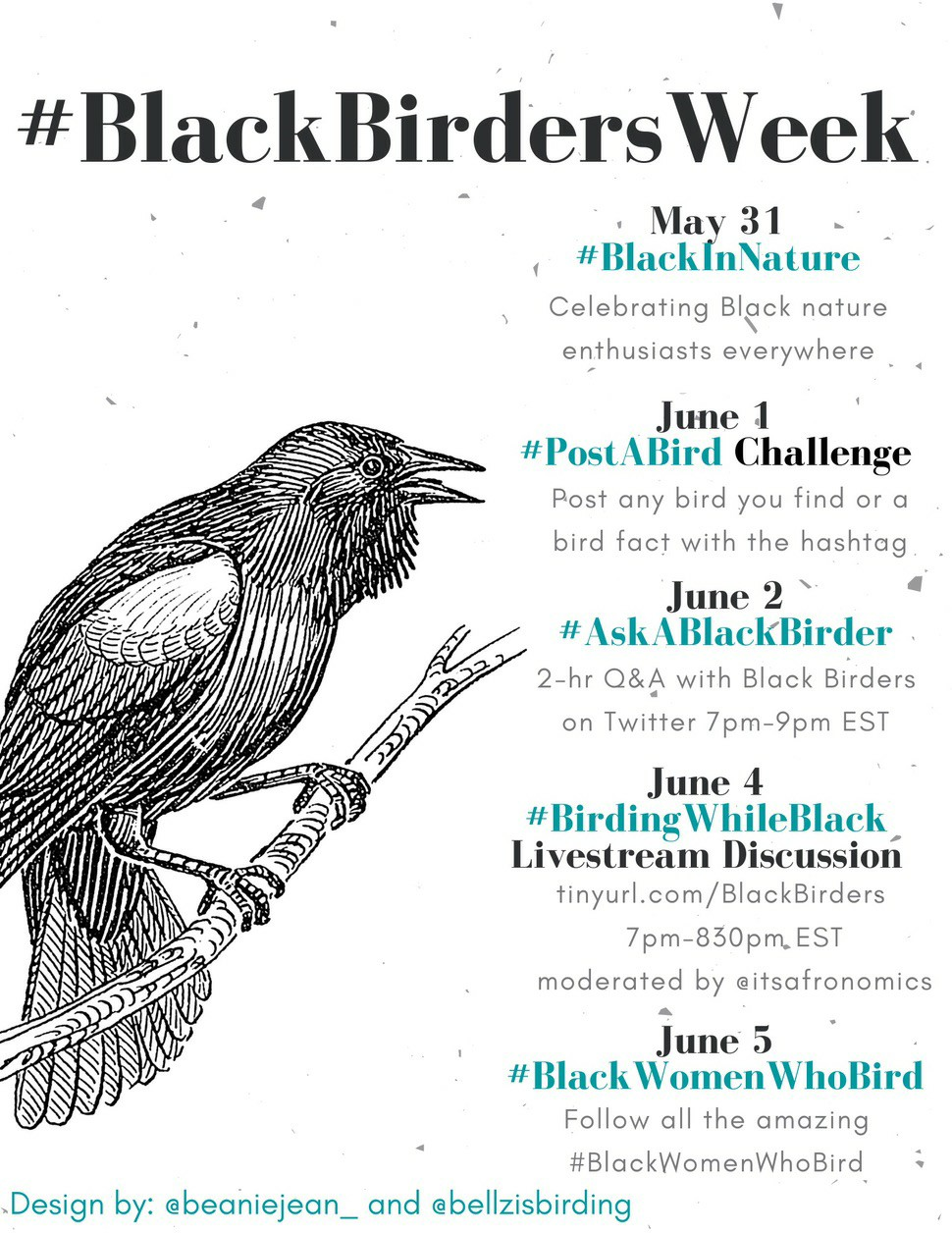This post has been edited on 2/19/21 to remove content featuring Jason Ward. Credible allegations of rape and sexual assault were brought against Jason Ward by Aisha White. You can learn more about this developing story in this article from Audubon that provides a summary of recent events. We stand with Aisha and admire her bravery in coming forward. In solidarity with Aisha, references and links to Jason’s work have been removed from this post.
Have you been following #BlackBirdersWeek? This week of online events and discussion, which ran from May 31st to June 5th, was created by a cohort of over 30 Black scientists and naturalists in response to the now infamous incident in Central Park on Memorial Day: where a White woman called the police to falsely report that a Black birder, Christian Cooper, was “threatening her life” after he asked her to leash her dog.
That same day in Minneapolis, George Floyd, a Black man accused of using a counterfeit $20 bill, was murdered by a police officer who kneeled on his neck for eight minutes. In the past two weeks we have seen our country protest, mourn, and reflect as we grapple with the aftermath of these events and the long history of violence, oppression, and systemic racism towards Black people and people of color.
These two incidents may initially seem distant but they are inextricably related. What happened to George Floyd is what could have potentially happened to Christian Cooper if things had gone just a little differently. The Black birding community knows this, and #BlackBirdersWeek has been an opportunity to not only highlight the passion, enthusiasm, and dedication that Black people have for birds, but also to educate on the harsh reality of fear, suspicion, and harassment that many of them experience in the field.
If you’re wondering why this topic is pertinent to a blog geared at new birders, it’s because that same history of oppression that’s shaped the fabric our society has also shaped access to the outdoors that we love. It’s shaped expectations about who can enjoy nature, who feels safe there, or who might pursue careers that work to protect it. And those are huge barriers for a person of color who wants to experience all the joys that comes with bird watching.
This past week’s #BlackBirdersWeek line-up of events. Image from the @BlackAFinSTEM instagram
This week’s Entryway to Birding blog post is going to highlight some of the content that’s emerged from this groundbreaking week dedicated to Black birders. Let’s start with who is behind it all! Over 30 black scientists, educators, naturalists, bird nerds, and more came together to organize this week. They include biology graduate student Corina Newsome, wildlife biologist Kassandra Ford, environmental educator Sheridan Alford, National Audubon’s government affairs officer Tykee James, and more. You can follow them and more at their jointly managed account @BlackAFinSTEM on Twitter and Instagram.
They set out to break stereotypes about Black people in nature, to share experiences of Black birders and the challenges they face, and to put a spotlight on the work of Black scientists and conservationists that are doing really awesome work for birds and environmental conservation. And oh boy, they succeeded.
The content that’s emerged in this past week has been phenomenal. My heart has soared watching such passion, joy, and enthusiasm for birds and nature flood the internet. And while the events of the week have concluded, that doesn’t mean that this celebration of Black birders is over. It’s opened a window to the many talented, inspiring, passionate Black voices out there that we need to be listening to—now more than ever.
#BlackBirdersWeek has also highlighted a number of issues about the accessibility of birding as a hobby and the lack of inclusivity of the birding community—issues that I’ve been immune to as a White female birder. I set out to write this Entryway to Birding blog series as a way to get new and aspiring birders feeling prepared and confident to get out birding, to enter a hobby that can be intimidating or overwhelming in its scope. But my mind was turned to the comparatively simple challenges of bird identification, of navigating field marks and complex bird songs, of learning when and where to go find birds.
I wasn’t in tune with the challenges of navigating a community where one might not feel welcome, of learning which places may be safe to visit alone, of identifying who may or may not be an ally in the field. These are things I haven’t had to think about as a White birder. But for Black birders and birders of color, the challenges go far beyond the complexities of a tricky bird ID. They can be a matter of life or death. A simple interaction in a park can turn threatening in an instant, as Christian Cooper found.
The birding community, the conservation community, outdoor-lovers in general—we all have a lot of work to do. We need to make sure that everyone feels safe exploring the natural world that we all share. We need to make birding an inclusive and welcoming space for everyone, regardless of their skin color. We need to listen to Black voices when they tell us what we could be doing better.
All of that starts with education and reflection. That’s why this week’s Entryway to Birding blog is going to highlight some of the awesome content that was featured during #BlackBirdersWeek—just in case you missed it! And throughout future posts, I plan to continue to share more birding resources that are coming from voices of color to better represent the diversity of the birding community.
Read on for some #BlackBirdersWeek highlights. I know everyone has a lot on their minds and a growing list of things to read to better educate themselves, so I’ve broken these suggestions up by how much time they might take you to explore.
Screenshot of @blackafinstem’s #BecauseOfBlackBirdersWeek instagram post.
Got half an hour? Browse reflections on the impact of this week by exploring the hashtag for #BecauseOfBlackBirdersWeek and see how much representation truly matters.
If you had any doubt that this week could make an impact, this hashtag will prove you very, very wrong. I’ve been excited to watch these reflections on the week roll in because it all points to how much momentum this week has gathered—and how many potential new birders may be joining the hobby soon! Nothing makes me happier to see more people fall in love with birding. This hobby can be life-altering, world-changing. To see that more people are curious about birds and feeling even just a little more comfortable getting out to look for them? That’s everything.
Got an hour or two to spare? Watch the recorded livestreams of the #BirdingWhileBlack discussion.
Click here to watch Part 1, featuring Christian Cooper, Jeffrey Ward, Corina Newsome, and Kassandra Ford.
Click here to watch Part 2, featuring J. Drew Lanham, Sheridan Alford, Brianna Amingwa, Danielle Bellany, and Deja Perkins.
These candid conversations are a must-watch. These two Zoom panel sessions are probably what’s left the biggest impact on me this week. Each session tackles some serious topics about the often dangerous realities of birding while Black. But each also highlights the joy, the strength, the pride that comes with enjoying a hobby that one cares deeply about.
As a White birder, both of these sessions have given me a lot to reflect on as I think about my own habits and my own behaviors in the field, about what I may be taking for granted, and about how I can be a better ally. Watch these videos and take these experiences and suggestions to heart.
Looking for a new book to read? Check out J. Drew Lanham's memoir The Home Place: Memoirs of a Colored Man’s Love Affair with Nature.
J. Drew Lanham is a college professor and wildlife biologist at Clemson University, but he is also a renowned author and poet. This memoir explores his youth growing up in South Carolina, his connection to his family’s homestead and the land that shaped his family’s history, and his experiences as a Black birder and conservation professional in a predominantly White field.
I just put this on order, so I haven’t actually read this yet, but it’s come highly recommended. I have read excerpts from this memoir that share some of his experiences as a Black birder and his thoughts on the intricate connection between land, place, and self. The excerpts are well worth a read in and of themselves.
These are just highlights of some of the content that #BlackBirdersWeek has shared with the world. I encourage you, if you haven’t already, to spend time exploring the wealth of content that emerged from the past week’s events. Even if you don’t have a social media account on Twitter or Instagram, a simple search of #BlackInNature, #AskABlackBirder, or #BirdingWhileBlack will take you to hundreds of posts and articles about this groundbreaking week in the birding community.
_____
If you're at the end of this post and still wondering what any of this has to do with learning how to bird, the answer is ... everything. It has everything to do with how we bird. Birding, whether you're out there by yourself or not, revolves around community and connection. If you care about birds, then you should also care about your fellow birders.
Being a good birder is about doing everything within your power to make sure that this hobby is inclusive and welcoming for anyone who is interested. Because, as Madison Audubon’s chair member Topf Wells wrote in his reflection on our organization’s commitment to diversity, "our birds need all the friends they can get."
_____
Caitlyn is the Communications and Outreach Assistant at Madison Audubon. She’s crazy for birds because they changed her life. She’ll be back next Monday with some tips and tools for birders, new and experienced! Between now and then, she’d love to hear about the birds you’re seeing and hearing. Leave a comment below or email to drop her a line!






